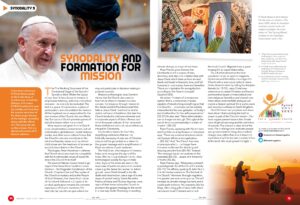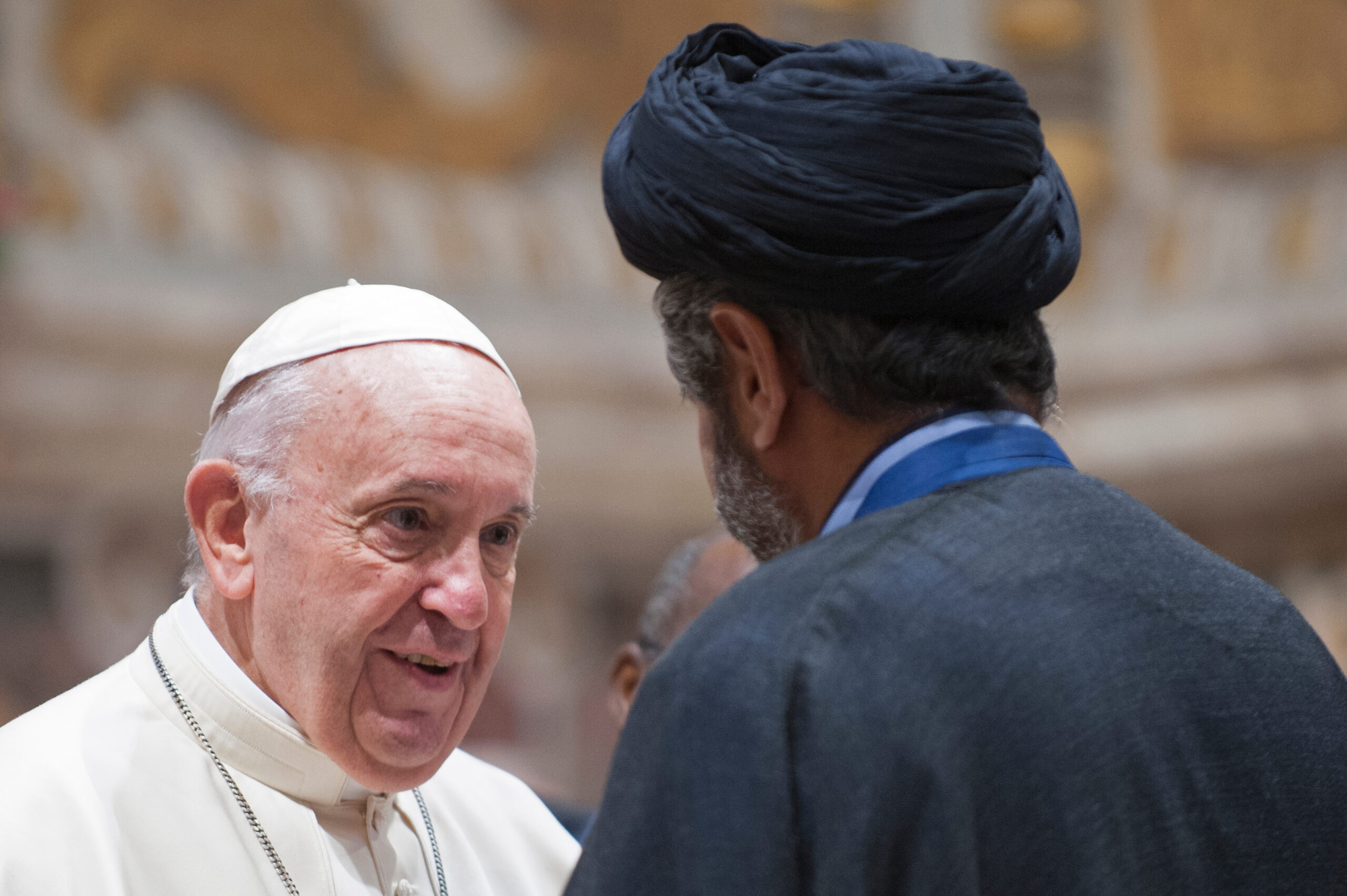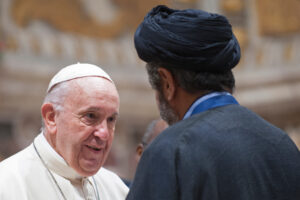
“Pope Francis gives witness that Christianity is not a corpus of laws, doctrines, and rites. It is a relationship with Jesus Christ.” Image: Shutterstock
Columban missionary Fr Frank Hoare spoke to the Federation of Conferences of Catholic Bishops of Oceania (FCBCO) earlier this year. Synodality and formation for mission were two of the three major themes of the bishops’ assembly along with the effects of a changing climate on the oceans. This is a shortened version of Fr Hoare’s address.
The Working Document of the Continental Stage of the Synod of Synods is titled ‘Widen the Space of your Tent.’ It has a focus on mission. It emphasises listening, welcome and radical inclusion – no one is to be excluded. The tent is a space of communion, a place of participation, and a foundation for mission. All the baptised are co-responsible for the one mission of the Church, the one Missio Dei. But can our Church provide spaces of radical inclusion when it is in crisis?
Many reasons are given for the Church crisis: secularisation, consumerism, radical individualism, globalisation, moral relativity, media, and other socio-cultural forces. But the Church’s own sins contribute to this silent earthquake; issues such as clerical child abuse and the treatment of women as second-class citizens in the Church.
Theologian, Peter Hunermann believes that Church structures must be compatible with the fundamental values of social life where the Church finds itself.
The Second Vatican Council tried to go beyond the hierarchical model in Lumen Gentium – the Dogmatic Constitution of the Church. Chapters One and Two spoke of the Church as mystery and as the People of God. However, the hierarchical nature of the Church followed in Chapter 3. Its juridical application remains the concrete experience of Church members. For example, lay people can give advice but may not participate in decision making in pastoral councils.
Missionary theologian Jose Comblin claims that the Church discovers its true nature when on mission in a new context. For instance, through mission to the Greek world St Paul discovered that faith in Jesus Christ need not be tied to Judaic culture and traditions. But later the Church tended to add new elements and incorporate aspects of Greco-Roman and other European cultures. It then accepted these institutional and cultural accretions as integral to Christianity.
Inculturation means, for Comblin, simplifying institutions that are not biblically necessary. A new era of Christian mission will be grounded on a return to the gospel message and a simplification of these accretions of past centuries.
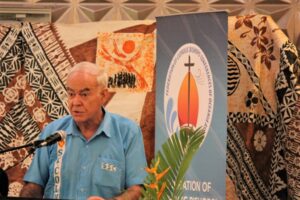
Fr Frank Hoare addressing the Federation of Conferences of Catholic Bishops of Oceania (FCBCO) earlier this year.
The Holy Spirit, the instigator of mission, helps us to recognise the signs of the times. We live in a globalised mainly urban technological society facing a climate crisis. Signs of the times are seen in the responses of particular persons to societal crises e.g. the Samaritan woman in John’s gospel. Jesus Christ himself, in his life, death and resurrection, was a sign of a new stage of sacred history. Saints Benedict, Francis of Assisi and Thomas Aquinas, were signs of their times calling the Church to proclaim the gospel message to the world in a new way. Greta Thunberg, in resisting climate change, is a sign of our times.
Pope Francis gives witness that Christianity is not a corpus of laws, doctrines, and rites. It is a relationship with Jesus Christ which frees us from sin and death and leads to freedom, love, and full humanity in community, here and hereafter. This is our inspiration for evangelisation according to the Pope in Evangelium Gaudium (EG).
He writes: “I dream of ‘a missionary option’ that is, a missionary impulse capable of transforming everything so that the Church’s … structures can be suitably channelled for the evangelisation of today’s world rather than for her self-preservation.” (EG 27) He also said, “Mere administration can no longer be enough. Throughout the world, let us be permanently in a state of mission.” (EG 25)
Pope Francis, agreeing with Hunermann and Comblin on simplification of structures says, “There are ecclesial structures which can hamper efforts at evangelization … (EG 26).” And “the Church has rules or precepts which… no longer have the same usefulness for directing and shaping people’s lives (EG 43).” Instead “the message has to concentrate on the essentials (EG 35) …aware of a ‘hierarchy’ of truths (EG 36).
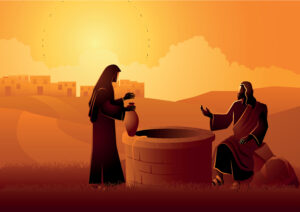
Jesus and Samaritan woman at the well. Image: Shutterstock
Pope Francis says, “Missionary outreach is paradigmatic for all the Church’s activity (EG 15).” He affirms, quoting St John Paul II, that Ad Gentes mission is “the first task of the Church.” However, through migration, the ‘gentes’ are now coming to us. This will increase as climate change worsens and it could spark violence. Yet, migrants, like the Magi, often bring gifts of deep faith which can inspire local Christians and enrich the local Church. Migrants have a great longing for an equal relationship.
For a fruitful interaction the host population must be open to migrants. Openness and friendship are a sign of a Church with a missionary outlook. Jesus broke down barriers by calling his disciples friends (Jn. 15:15). Jesus Christ now missions us to create Christian and human communities based on intercultural and inter-religious friendship and mutual love. Intercultural and interfaith dialogue can inspire a deeper spiritual life in participants and become a witness to God’s Kingdom.
The Old Testament prophets and Jesus have shown that speaking the truth to power is part of the Church’s mission. Our most urgent present issue is the climate crisis of global warming and the extinction of species. The science is clear about the crisis. The challenge is to motivate people and governments to bring about radical change now, rather than kick it down the road when it will be too late. Laudato Si has lit the torch. We must spread the light.
Fr Frank Hoare is from Ireland. He has been on mission in Fiji since 1973, where he has been involved in parish work and student formation. He is the author of ‘The Turning Wheel’, a history of the Columban missionaries’ work in Fiji, which is available for €10 from our shop here: https://columbans.ie/product/the-turning-wheel/
This article was published in the May/June 2023 issue of the Far East magazine. You can support Columban missionaries by subscribing here:
